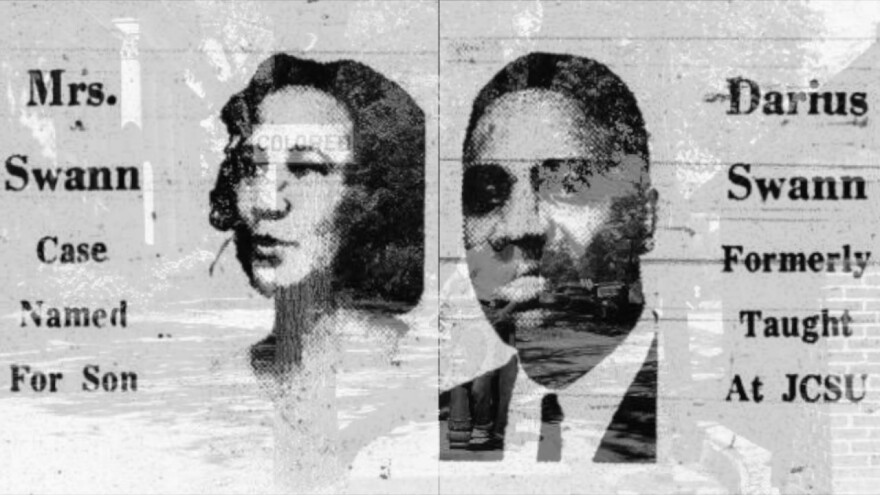In addition to the lost lives and the thousands of people who have fallen ill from the coronavirus, the country and especially Charlotte lost a legendary figure this month. On March 8, the Rev. Dr. Darius Swann died at the age of 95 from pneumonia.
Swann’s name is attached to one of the most important court decisions regarding education and desegregation — Swann v. Charlotte Mecklenburg Board of Education. The 1969 lower federal court ruling and the 1971 Supreme Court decision in Swann paved the way for busing in Charlotte as a way to desegregate public schools. By 1980, Charlotte schools had integrated at an unprecedented level and was looked upon by cities across the country as a model to use in desegregating the nation’s public schools. Historian and author Pamela Grundy picks up the story there.
Pamela Grundy: The Swanns really believed in integrated education. And so when they returned to Charlotte, which they did very deliberately in order to become part of the struggle. There's a story that when they were in India, they saw the picture of Dorothy Counts when she attempted to integrate Harding High School. And they knew her father, Reverend Counts, who was a professor at Johnson C. Smith.
Gwendolyn Glenn: Which is where he graduated and went to theology school, Johnson C. Smith?
Grundy: Correct. And I believe the Swanns also met at Johnson C. Smith. So they had a real connection with the Counts. And this was a moment, a moment of seeing Dorothy and seeing what was happening in Charlotte was an important moment for them. And they determined that they would need to go back to the U.S. to participate in this unfolding struggle. And Reverend Swann got a position at Johnson C. Smith and then attempted to enroll their young son in an integrated school. They attempted to send him to the school that was closest to their house, which was a historically white school.
Glenn: That was Seversville Elementary School?
Grundy: Yes, that was Seversville Elementary School. It had been a white school. And they wanted to send their son there, not just because it was the closest, but really because they believed in integration. They wanted him to go to an integrated school. They were told he could not go there, he would have to go to a historically black school much farther away. They were dissatisfied with this. And that was what helped them decide to become part of the lawsuit.
Glenn: And my understanding at that time, this was in 1965, that only 2% of African Americans in Charlotte were enrolled in integrated schools. So this was a big thing?
Grundy: This was a big thing. Many African Americans had been attempting to enroll their children in historically white schools. So, essentially, every year, a number of African American families would ask that their children be admitted to white schools and the school board would find all sorts of excuses why that just wasn't possible.
Glenn: And to do this at this time, this was a very courageous thing that they really pushed, because my understanding is their lives were threatened, the lives of their lawyer, Julius Chambers, that this was a time when their lives were threatened because they were trying to integrate the schools?
Grundy: It was dangerous to challenge the status quo here in Charlotte as well as in other parts of the country. You had death threats. Also, there's all sorts of underneath stuff. You could lose your job. There were a number of Charlotte families who were part of this lawsuit. It was not merely the Swanns, but in part, because Reverend Swann was employed by Johnson C. Smith, that gave the Swanns a little bit of protection. Johnson C Smith wasn't going to fire him for pressing for integration. So that was helpful. And I believe it is part of the reason why they were the lead plaintiff with their name on the lawsuit. But it was still a risk.
Glenn: In the early 2000s, you met Reverend Swann. Tell us about that.
Grundy: The time that I met Mr. Swann, I was presenting at a conference and I was at that point thinking a lot about the resource issue. And then in the back of the room, there's this very gentlemanly man who raises his hand. And he says, "I would just like to say that my name is Reverend Swann. And I did want my child to have those experiences. I really did want them to learn about other children and other cultures, wanting them to be open-minded, wanting to experience the world, understanding that you don't know everything." I think that was very much who he was.
Glenn: And in terms of Swann, when those decisions were made, the final decision by the Supreme Court, he was not living in Charlotte. But the case itself had ramifications nationwide. Correct?
Grundy: Well, the case really was the most far-reaching desegregation case. It was the last great desegregation case. And they created the most desegregated major school system in the country. This one case had, in fact, created what the Swanns wanted for their children, which was an integrated system where children had more equal education and were also able to interact with each other, able to know each other. And that was so important to them.
Glenn: Well, thank you so much for talking with us.
Grundy: Thanks so much.


